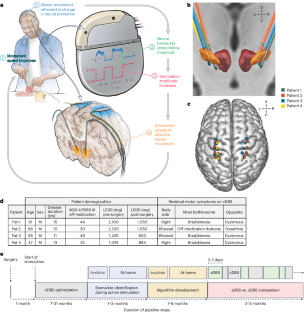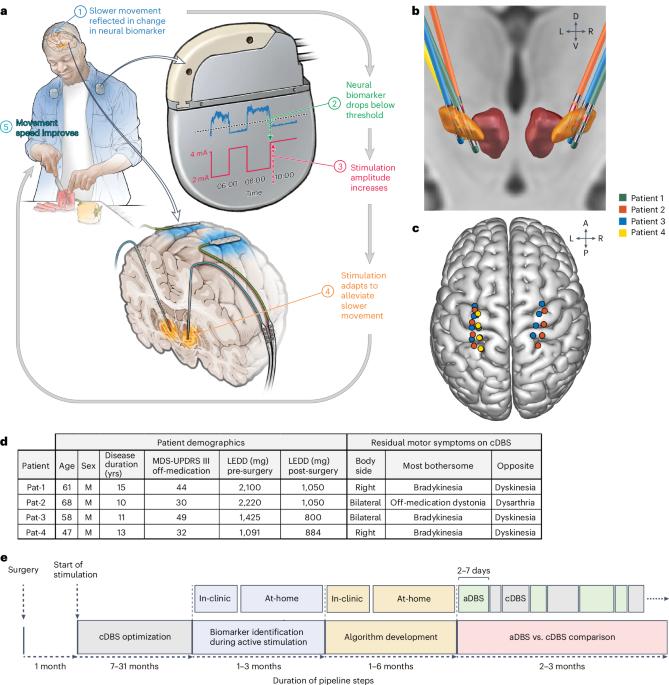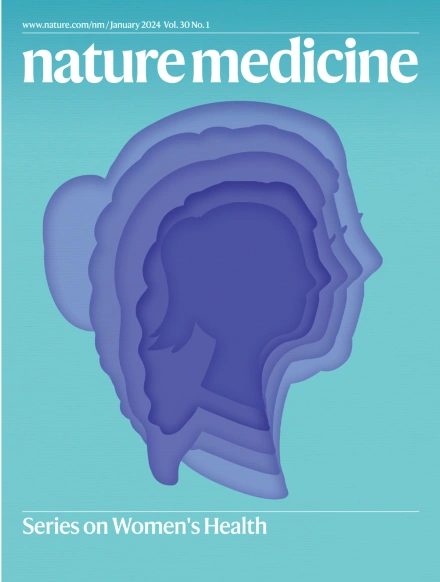帕金森病患者的慢性自适应深部脑刺激与传统刺激:一项盲法随机可行性试验
IF 58.7
1区 医学
Q1 BIOCHEMISTRY & MOLECULAR BIOLOGY
引用次数: 0
摘要
深部脑刺激(DBS)是一种广泛应用于帕金森病(PD)的疗法,但缺乏对临床和神经状态变化的动态响应。反馈控制可以提高治疗效果,但 "自适应 "神经刺激的最佳控制策略和额外益处尚不清楚。在此,我们介绍了一项盲法随机交叉试验的结果,该试验旨在确定帕金森病患者特定运动体征的神经相关性,以及使用这些信号驱动自适应 DBS 的可行性。我们从因运动波动而接受 DBS 植入术的人群中招募了四名男性帕金森病患者,每位患者都接受了自适应 DBS 和连续 DBS 治疗。我们在所有四名患者中确定了刺激诱导的丘脑下核或运动皮层伽马振荡是多巴胺能状态高低及其相关残余运动症状的最佳标记。我们随后证明,与临床优化的标准刺激相比,适应性刺激可改善运动症状和生活质量。这项试点试验的结果凸显了基于数据驱动选择神经信号的个性化自适应神经刺激治疗帕金森病的前景。此外,这些发现还为进一步开展更大规模的临床试验、评估个性化自适应神经刺激对帕金森病和其他神经系统疾病的疗效奠定了基础。ClinicalTrials.gov 注册:NCT03582891。本文章由计算机程序翻译,如有差异,请以英文原文为准。


Chronic adaptive deep brain stimulation versus conventional stimulation in Parkinson’s disease: a blinded randomized feasibility trial
Deep brain stimulation (DBS) is a widely used therapy for Parkinson’s disease (PD) but lacks dynamic responsiveness to changing clinical and neural states. Feedback control might improve therapeutic effectiveness, but the optimal control strategy and additional benefits of ‘adaptive’ neurostimulation are unclear. Here we present the results of a blinded randomized cross-over pilot trial aimed at determining the neural correlates of specific motor signs in individuals with PD and the feasibility of using these signals to drive adaptive DBS. Four male patients with PD were recruited from a population undergoing DBS implantation for motor fluctuations, with each patient receiving adaptive DBS and continuous DBS. We identified stimulation-entrained gamma oscillations in the subthalamic nucleus or motor cortex as optimal markers of high versus low dopaminergic states and their associated residual motor signs in all four patients. We then demonstrated improved motor symptoms and quality of life with adaptive compared to clinically optimized standard stimulation. The results of this pilot trial highlight the promise of personalized adaptive neurostimulation in PD based on data-driven selection of neural signals. Furthermore, these findings provide the foundation for further larger clinical trials to evaluate the efficacy of personalized adaptive neurostimulation in PD and other neurological disorders. ClinicalTrials.gov registration: NCT03582891 . A small clinical study shows that adaptive deep brain stimulation (DBS), based on real-time brain activity, for Parkinson’s disease significantly improved motor symptoms and quality of life compared with conventional DBS.
求助全文
通过发布文献求助,成功后即可免费获取论文全文。
去求助
来源期刊

Nature Medicine
医学-生化与分子生物学
CiteScore
100.90
自引率
0.70%
发文量
525
审稿时长
1 months
期刊介绍:
Nature Medicine is a monthly journal publishing original peer-reviewed research in all areas of medicine. The publication focuses on originality, timeliness, interdisciplinary interest, and the impact on improving human health. In addition to research articles, Nature Medicine also publishes commissioned content such as News, Reviews, and Perspectives. This content aims to provide context for the latest advances in translational and clinical research, reaching a wide audience of M.D. and Ph.D. readers. All editorial decisions for the journal are made by a team of full-time professional editors.
Nature Medicine consider all types of clinical research, including:
-Case-reports and small case series
-Clinical trials, whether phase 1, 2, 3 or 4
-Observational studies
-Meta-analyses
-Biomarker studies
-Public and global health studies
Nature Medicine is also committed to facilitating communication between translational and clinical researchers. As such, we consider “hybrid” studies with preclinical and translational findings reported alongside data from clinical studies.
 求助内容:
求助内容: 应助结果提醒方式:
应助结果提醒方式:


